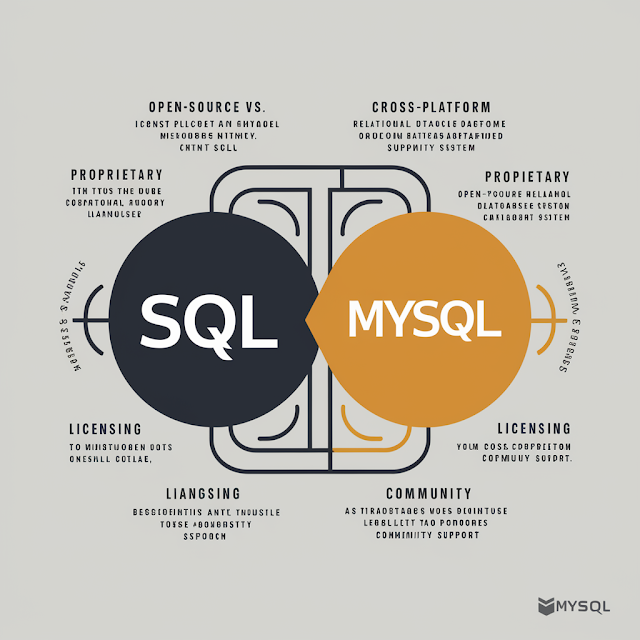What is The Difference Between SQL And MySQL With Example ?
What is The Difference Between SQL And MySQL With Example ?
Here's the difference between SQL and MySQL, along with an example to illustrate:
SQL (Structured Query Language)
What it is: A standardized language used to communicate with relational databases.
What it does: Lets you create, manage, and manipulate data within relational databases.
Think of it as: A universal translator you use to give instructions to different relational database systems.
MySQL
What it is: A specific relational database management system (RDBMS).
What it does: Stores, organizes, and retrieves data in a structured format using tables with rows and columns.
Think of it as: An actual library building that uses SQL commands to manage the books (data) inside.
Example
Imagine you want to find all the books written by a particular author in a library (MySQL database). You wouldn't shout inside the library looking for the books. Instead, you'd talk to the librarian (using SQL) to search the library catalog (database).
Here's a basic SQL query you could use:
This query, written in SQL, instructs the MySQL library system (which understands SQL) to:
Select all data (*)
From the "books" table
Where the "author" column matches "John Doe"
MySQL would then search its database and return a list of all books written by John Doe.
Key Differences
SQL is a language, MySQL is a software system.
SQL is universal, MySQL is specific. You can use SQL to interact with many different relational databases, not just MySQL.
SQL focuses on data manipulation, MySQL focuses on data storage and management.
I hope this clarifies the distinction between SQL and MySQL!
Certainly! Here's a deeper dive into the differences between SQL and MySQL:
Scope:
SQL: Designed for a broader range of relational databases. It provides a standardized way to interact with data structures like tables, rows, and columns across different RDBMS platforms (e.g., Oracle, PostgreSQL, Microsoft SQL Server)
MySQL: Specific to the MySQL RDBMS. While it uses SQL as its primary language, there might be minor variations in functionalities or syntax compared to other SQL implementations.
Functionality:
SQL: Focuses on core database operations like:
Data Definition Language (DDL): Creating and modifying database structures (tables, indexes).
Data Manipulation Language (DML): Inserting, updating, deleting, and retrieving data.
Data Control Language (DCL): Granting and controlling access to data.
MySQL: Offers additional functionalities beyond core SQL:
User Management: Creating and managing user accounts with specific permissions.
Stored Procedures: Pre-written SQL code blocks for reusability.
Triggers: Automated actions based on specific events in the database (e.g., data insertion).
Updates:
SQL: As a standardized language, SQL itself doesn't receive frequent updates. However, the way different RDBMS platforms implement SQL might evolve over time.
MySQL: Being an actively developed software system, MySQL releases regular updates with new features, bug fixes, and security enhancements.
Security:
SQL: Security depends on the specific RDBMS implementation. Some platforms might offer more robust security features than others.
MySQL: Offers built-in security features like user authentication and access control. However, as open-source software, it might require more careful security configuration compared to some commercial RDBMS options.
Choosing Between Them:
SQL: If you need a language to interact with various relational databases, learning SQL is a wise investment. This core skill allows you to work with different RDBMS platforms.
MySQL: If you're building a web application or need a fast, scalable, and open-source database solution, MySQL is an excellent choice. It's a popular option for its ease of use, affordability, and wide range of functionalities.
I hope this additional information provides a clearer picture of the relationship between SQL and MySQL.
